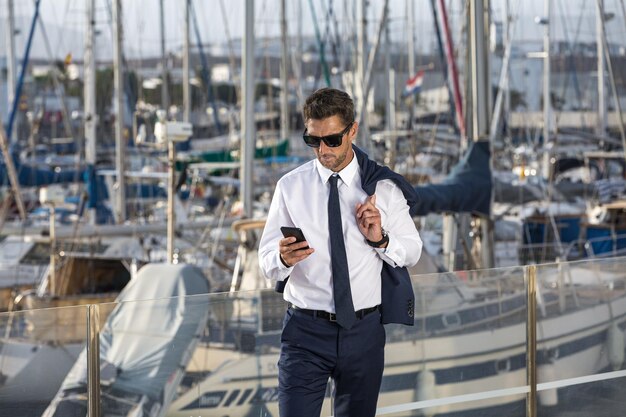
Reliable communication is essential for maritime operations, whether for commercial shipping, fishing vessels, or recreational boats. A marine telephone plays a crucial role in ensuring seamless communication between ships, ports, and emergency response teams. In the UAE, where maritime trade and tourism thrive, having an efficient communication system is vital. With vast coastlines and busy shipping routes, vessels need a dependable marine communication system to stay connected. This guide explores marine telephone technology, its features, and its significance for maritime activities in the UAE.
What is a Marine Telephone?
A marine telephone is a communication device designed for use at sea. Unlike standard mobile phones, marine telephones operate on specialized frequencies to maintain clear and uninterrupted communication. These devices function via Very High Frequency (VHF) radio, satellite networks, or Global Maritime Distress and Safety System (GMDSS) protocols. They are essential for ship-to-ship communication, weather updates, emergency assistance, and coordination with coastal authorities.
Types of Marine Telephones
1. VHF Marine Radio
VHF marine radios are the most commonly used marine telephones. They operate on international marine radio frequencies and are ideal for short-range communication. They allow vessels to communicate with nearby ships and coastal stations.
2. Satellite Marine Phones
Satellite marine telephones provide long-range communication, making them essential for offshore travel. They connect to satellite networks, ensuring coverage even in remote waters where traditional signals fail.
3. GMDSS-Compatible Phones
The Global Maritime Distress and Safety System (GMDSS) marine telephones are specifically designed for emergency communication. They comply with international safety regulations and enable distress signaling in case of emergencies.
4. MF/HF Radio Telephones
Medium Frequency (MF) and High Frequency (HF) marine telephones are suitable for long-distance communication. They use radio waves that bounce off the ionosphere, extending their reach beyond the horizon.
Key Features of Marine Telephones
1. Waterproof and Durable Design
Marine telephones are built to withstand harsh maritime conditions, including exposure to saltwater, humidity, and extreme temperatures.
2. Emergency Distress Signaling
Many marine telephones have built-in distress signaling features, such as Digital Selective Calling (DSC) and EPIRB (Emergency Position Indicating Radio Beacon) systems.
3. GPS Integration
Modern marine telephones often include GPS tracking, enabling vessels to share their location for navigation and safety purposes.
4. Noise Cancellation Technology
High-quality marine telephones come with noise-canceling microphones to ensure clear communication, even in rough sea conditions.
5. Long Battery Life
Marine communication devices are equipped with high-capacity batteries to ensure continuous operation during long voyages.
Importance of Marine Telephones in the UAE
1. Ensuring Maritime Safety
With a busy maritime industry, the UAE requires robust communication systems to enhance safety. Marine telephones help vessels coordinate with port authorities and rescue teams.
2. Regulatory Compliance
UAE maritime authorities require vessels to have proper communication systems, including marine telephones, to comply with international safety regulations.
3. Navigation Assistance
Marine telephones allow sailors to receive weather forecasts, route guidance, and real-time navigation updates, reducing the risk of accidents.
4. Emergency Response
In case of an accident, marine telephones facilitate rapid response by enabling distress calls to coast guards and emergency teams.
5. Enhancing Fishing and Commercial Operations
Fishing boats and commercial ships in the UAE use marine telephones to communicate with supply stations, ensuring smooth operations.
How to Choose the Right Marine Telephone in the UAE
1. Determine Your Communication Needs
For short-range communication near the UAE coastline, a VHF marine radio is sufficient. For deep-sea voyages, a satellite marine phone is a better option.
2. Check UAE Maritime Regulations
Ensure the device complies with UAE’s maritime communication standards and is approved for use on local waters.
3. Consider Durability and Waterproof Ratings
Since marine environments are harsh, opt for a waterproof and corrosion-resistant telephone with an IP67 or IP68 rating.
4. Battery Life and Power Source
Choose a marine telephone with long battery life or one that supports alternative power sources like solar charging.
5. Look for Additional Features
GPS tracking, DSC distress calling, and multi-band frequency support are essential features to enhance communication reliability.
Conclusion
A marine telephone is a vital tool for safe and efficient maritime communication in the UAE. Whether for commercial shipping, fishing, or recreational boating, having a reliable marine communication system ensures seamless connectivity. By understanding the different types, features, and importance of marine telephones, vessel operators can make informed choices to enhance safety and efficiency at sea. Ensuring compliance with UAE maritime regulations and investing in the right technology will help maintain smooth operations on the country’s busy waters.